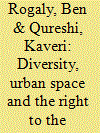|
|
|
Sort Order |
|
|
|
Items / Page
|
|
|
|
|
|
|
| Srl | Item |
| 1 |
ID:
123190


|
|
|
|
|
| Publication |
2013.
|
| Summary/Abstract |
Using three vignettes of the same physical space this article contributes to understanding of how the right to the city is contested in provincial England in the early twenty-first century. Oral history and ethnographic material gathered in Peterborough between 2010 and 2012 are drawn on to shed new light on the politics of diversity and urban space. This highlights the multiple place attachments and trans-spatial practices of all residents, including the white ethnic majority, as well as contrasting forms of active intervention in space with their different temporalities and affective intensities. The article carries its own diversity politics, seeking to reduce the harm done by racism through challenging the normalisation of the idea of a local, indigenous population, left out by multiculturalism. It simultaneously raises critical questions about capitalist regeneration strategies in terms of their impact both on class inequality and on the environment.
|
|
|
|
|
|
|
|
|
|
|
|
|
|
|
|
| 2 |
ID:
155417


|
|
|
|
|
| Summary/Abstract |
Riots, social exclusion, and endless improvement programmes have been a feature of the poorest neighbourhoods in France and England for the last thirty-five years or more—particularly focused on large social housing estates. Programmes of improvement have followed similar paths in each country, with mixed success. This article sets out a short overview of these programmes in each country, then contrasts and compares the objectives, approaches, and outcomes. Each country has key elements of inter-agency working, local and resident participation and planning, large-scale building rehabilitation and demolition programmes, though the French system is more often based on specific local contracts between cities and the central departments. Similar evaluation outcome indicators and frameworks of ‘floor’ and ‘gap’ targets have been set, although evidence of success is limited and, particularly in France, there has been considerable criticism of the approach and framework. In parallel, however, the concept of ‘mixed communities’ has emerged as an alternative strategic approach—intuitively reasonable, politically popular, but lacking an evidence base and often ineffective in dealing with poverty.
|
|
|
|
|
|
|
|
|
|
|
|
|
|
|
|
|
|
|
|
|